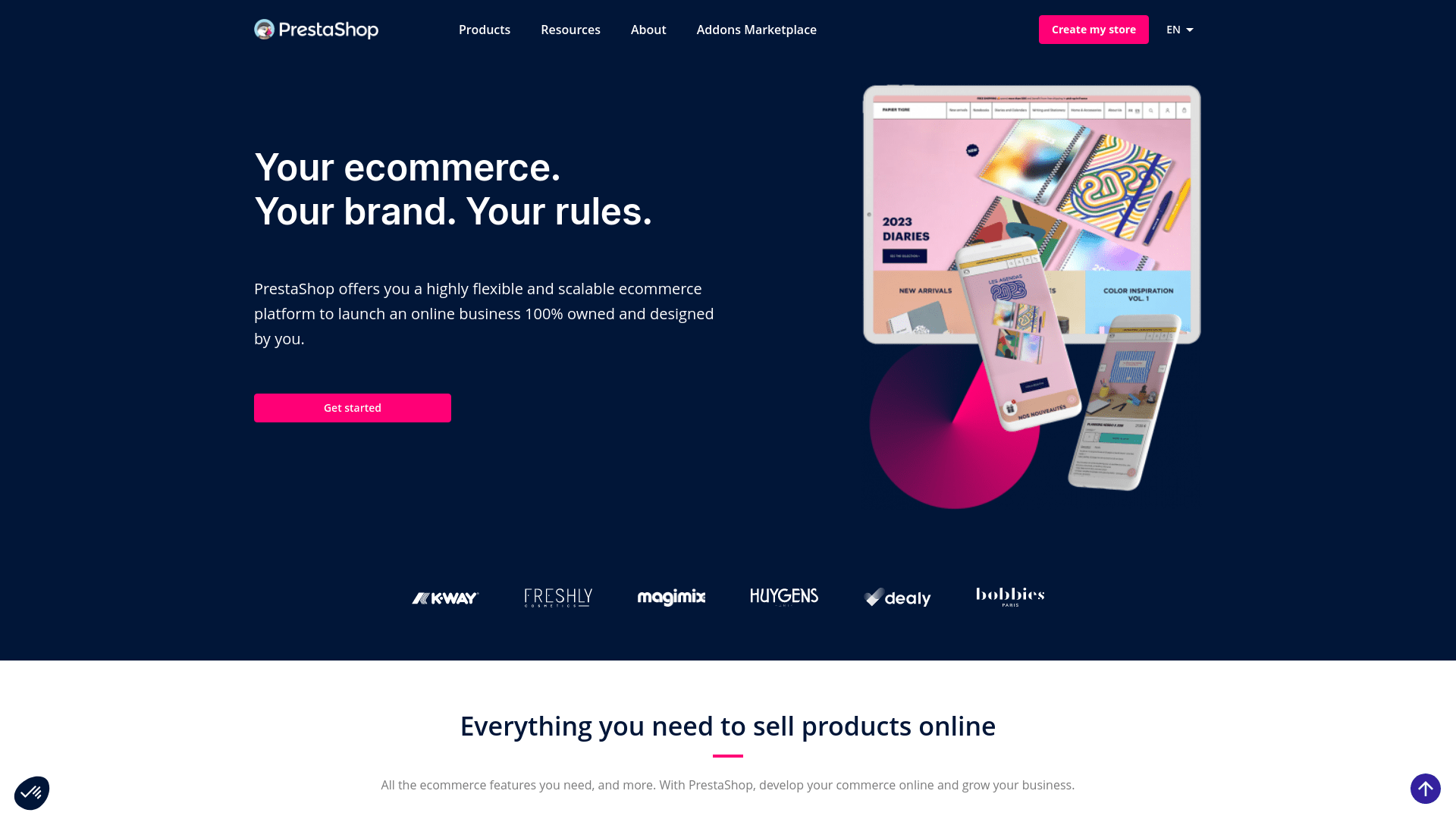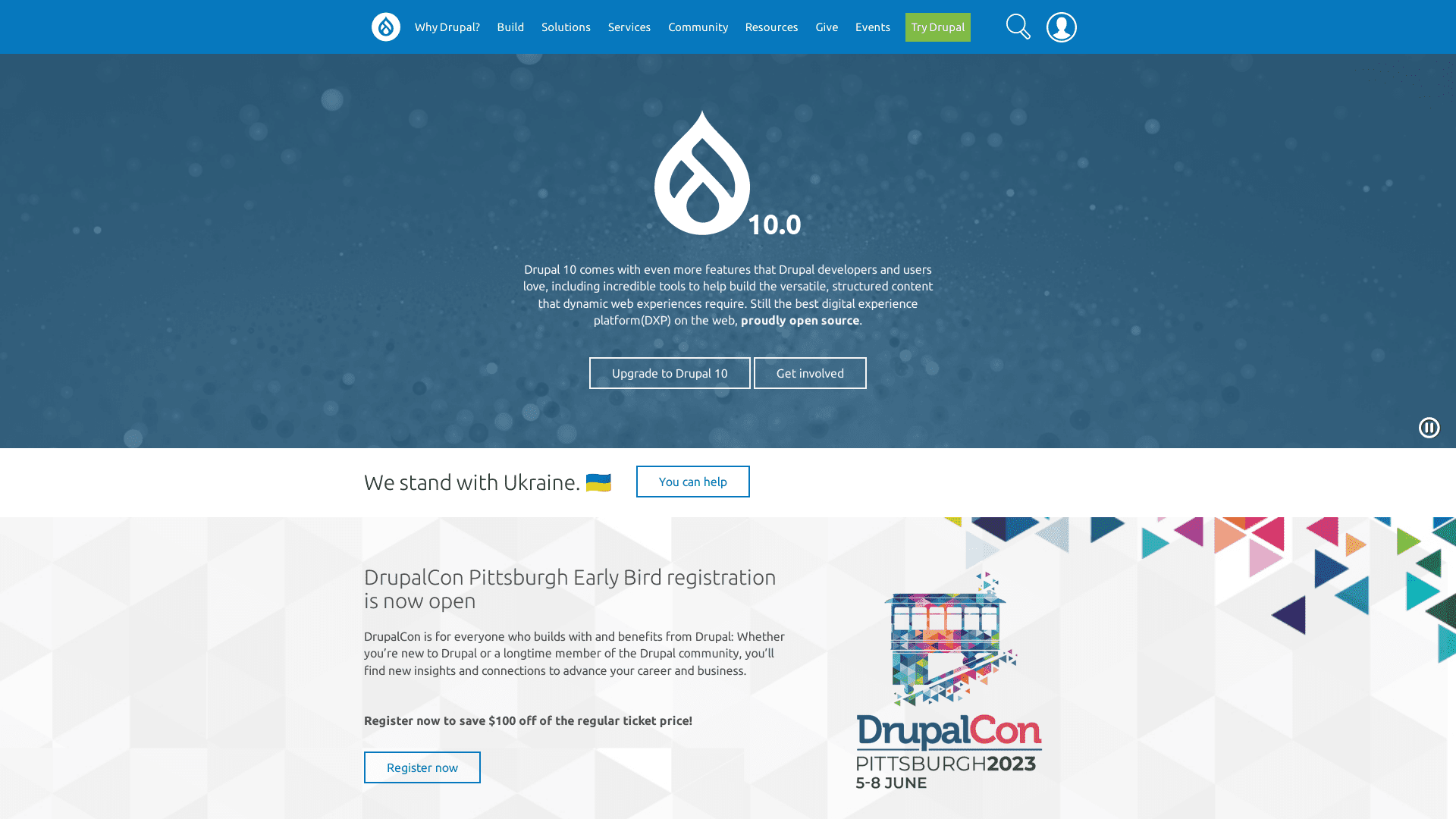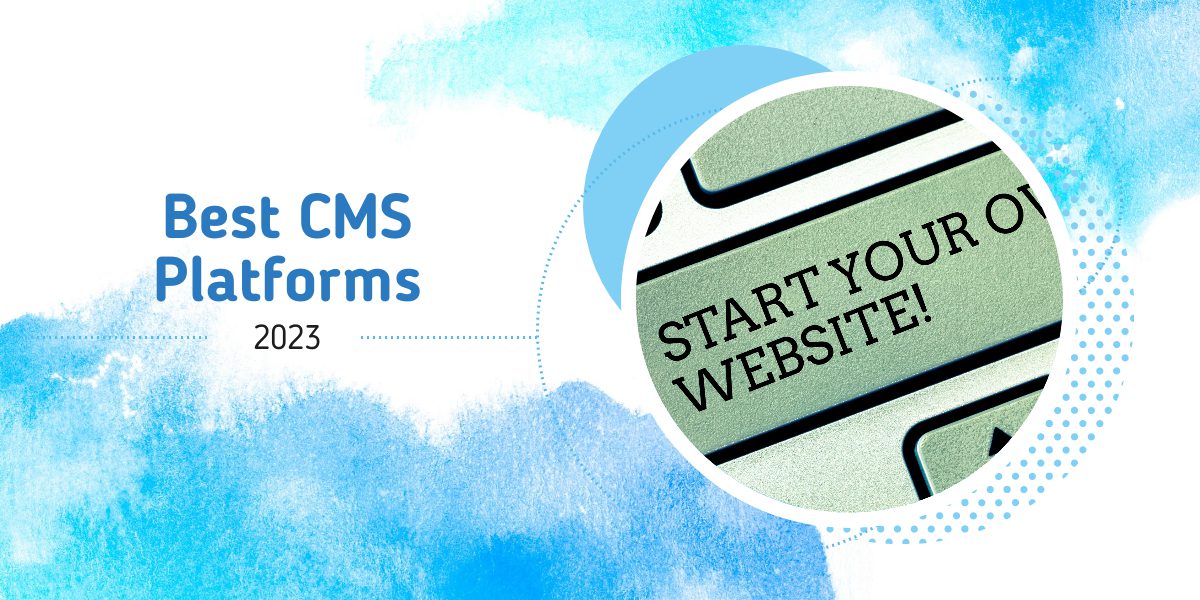Creating a website can seem daunting, especially if you’re unfamiliar with web design and development. Fortunately, a range of Content Management Systems (CMS) available makes creating a website easier and more accessible than ever before. In this article, we will look at the best CMS platforms to start a website in 2023. From WordPress to Shopify, Wix to Joomla, we will explore each platform’s features and benefits, helping you choose the best CMS for your needs. Whether you’re creating a personal blog, online store, or professional website, a CMS platform can help you get started. So, let’s dive in and look at the top CMS platforms available in 2023.
WordPress

WordPress is undoubtedly one of the most popular CMS platforms available today. It’s estimated that over 40% of all websites on the internet are powered by WordPress. The platform is renowned for its versatility, scalability, and ease of use, making it an ideal choice for businesses of all sizes.
One of the most significant advantages of WordPress is its vast ecosystem of plugins and themes. There are thousands of free and premium plugins and themes available that can be used to extend the functionality of a website. These plugins can be used to add features such as social media integration, e-commerce functionality, search engine optimization, and much more. Similarly, numerous themes can be used to change the look and feel of a website.
WordPress is also known for its ease of use. The platform is designed to be user-friendly, and even those with no coding experience can create a website using WordPress. The platform uses a simple drag-and-drop editor, and the visual editor allows users to see what their website will look like in real time.
Another significant advantage of WordPress is its scalability. The platform can create websites of all sizes, from simple blogs to complex e-commerce sites. This scalability makes WordPress an excellent choice for businesses wanting to grow and expand their online presence.
Another advantage of WordPress is its SEO capabilities. The platform is designed to be search engine friendly, and numerous plugins can be used to optimize a website for search engines. This is important for businesses that want to attract organic traffic and improve their search engine rankings.
Finally, WordPress is an open-source platform, meaning it’s continually being developed and improved by a community of developers. This ensures that the platform remains updated with the latest web technologies and security standards.
In conclusion, there are many CMS platforms available, each with its unique features and benefits. When choosing a CMS for your business, it’s essential to consider your specific needs and requirements. WordPress is an excellent choice for businesses of all sizes, thanks to its versatility, scalability, ease of use, SEO capabilities, and vast ecosystem of plugins and themes. With its constant development and improvement, WordPress remains a top choice for creating a professional and functional website.
Webflow

Webflow is a modern CMS platform designed for designers and marketers who want to create professional websites without writing code. It offers a visual drag-and-drop interface allowing users to create custom designs and layouts easily. Webflow offers a range of features, including responsive design, SEO optimization, and e-commerce functionality. It’s also known for its fast loading times and high levels of security.
Webflow’s most significant advantage is its user-friendliness. It’s designed to be intuitive, making it easy for even those without coding experience to create a professional website. The visual editor allows users to drag and drop elements onto the page, and the design grid makes it easy to create responsive layouts. The platform also offers a range of templates, which can be customized to suit various business needs.
Another advantage of Webflow is its e-commerce functionality. The platform offers a range of essential features for online stores, such as shopping cart functionality, product management, and order processing. Webflow also integrates with various payment gateways, making it easy for businesses to accept payments online.
Webflow is known for its fast loading times, essential for providing a good user experience. The platform uses a content delivery network (CDN) to ensure that website content is delivered quickly to visitors, regardless of their location. This is important for businesses that want to provide a seamless user experience, as slow loading times can result in visitors leaving the site.
Finally, Webflow is known for its high levels of security. The platform uses SSL encryption to protect user data and offers a range of security features to prevent hacking and other malicious activity. This is important for businesses that handle sensitive data, such as personal and financial information.
In conclusion, many CMS platforms are available, each with unique features and benefits. When choosing a CMS for your business, it’s essential to consider your specific needs and requirements. For those looking for an easy-to-use platform with modern design capabilities, Webflow is an excellent choice. Its user-friendliness, e-commerce functionality, fast loading times, and high levels of security make it an excellent option for businesses and individuals looking to create a professional website without needing to write code.
Shopify

Shopify is a popular CMS that’s specifically designed for e-commerce businesses. The platform is known for its ease of use and scalability, making it an ideal choice for businesses of all sizes. With its vast ecosystem of plugins and themes, Shopify makes it easy to create a professional and functional online store.
One of the biggest advantages of Shopify is its user-friendly interface. The platform uses a drag-and-drop editor, making it easy to customize your online store. Additionally, Shopify provides a variety of templates that can be used to create a unique and professional-looking website.
Another advantage of Shopify is its scalability. The platform can be used to create online stores of all sizes, from small boutiques to large retailers. Shopify can be easily customized to meet your changing needs as your business grows.
Shopify is also known for its e-commerce features, including managing products, tracking inventory, processing payments, etc. The platform integrates with various payment gateways, making it easy to accept payments from customers worldwide.
In addition to its e-commerce capabilities, Shopify provides a variety of marketing tools that can be used to drive traffic and increase sales. These tools include email marketing, social media integration, and search engine optimization.
Finally, Shopify is known for its security features. The platform provides a variety of security measures to protect your website and customer information. These measures include SSL certificates, two-factor authentication, and fraud detection.
In conclusion, there are many CMS platforms available, each with its own unique features and benefits. When choosing a CMS for your business, you must consider your specific needs and requirements. Shopify is an excellent choice for e-commerce businesses of all sizes thanks to its user-friendly interface, scalability, e-commerce features, marketing tools, and security measures. With its constant development and improvement, Shopify remains a top choice for creating a professional and functional online store.
Wix

Wix is a famous website builder gaining popularity as a CMS platform. The platform is known for its ease of use and drag-and-drop editor, making it an ideal choice for businesses and individuals who want to create a website quickly and easily.
One of the biggest advantages of Wix is its user-friendly interface. The platform uses a drag-and-drop editor, making it easy to customize your website. Additionally, Wix provides a variety of templates that can be used to create a unique and professional-looking website.
Another advantage of Wix is its scalability. The platform can create websites of all sizes, from small personal to large corporate websites. Wix can be easily customized to meet your changing needs as your business or website grows.
Wix is also known for its vast ecosystem of plugins and apps that can be used to extend the functionality of a website. These plugins can be used to add features such as social media integration, e-commerce functionality, search engine optimization, and much more.
In addition to its user-friendly interface and scalability, Wix provides a variety of marketing tools that can be used to drive traffic and increase sales. These tools include email marketing, social media integration, and search engine optimization.
Finally, Wix is known for its customer support. The platform provides various resources to help users create and manage their websites. These resources include tutorials, FAQs, and a community forum where users can ask for help and advice.
In conclusion, there are many CMS platforms available, each with its own unique features and benefits. When it comes to choosing a CMS for your business, it’s essential to consider your specific needs and requirements. Wix is an excellent choice for businesses and individuals who want to create a website quickly and easily, thanks to its user-friendly interface, scalability, an ecosystem of plugins and apps, marketing tools, and customer support. With its constant development and improvement, Wix remains a top choice for those looking to create a professional and functional website.
Squarespace

Squarespace is a popular CMS platform known for its beautiful templates and easy-to-use interface. The platform is an excellent choice for businesses and individuals who want to create a professional-looking website quickly and easily.
One of the biggest advantages of Squarespace is its templates. The platform offers a variety of beautiful and modern templates that can be used to create a unique and professional-looking website. Additionally, the templates are mobile-responsive, meaning your website will look great on all devices.
Another advantage of Squarespace is its user-friendly interface. The platform uses a drag-and-drop editor, making it easy to customize your website. Additionally, Squarespace provides a variety of tools that can be used to add features such as e-commerce functionality, social media integration, and search engine optimization.
Squarespace is also known for its e-commerce features. The platform can be used to create online stores of all sizes, from small boutiques to large retailers. Additionally, Squarespace provides a variety of tools that can be used to manage products, track inventory, and process payments.
In addition to its e-commerce capabilities, Squarespace provides a variety of marketing tools that can be used to drive traffic and increase sales. These tools include email marketing, social media integration, and search engine optimization.
Finally, Squarespace is known for its customer support. The platform provides various resources to help users create and manage their websites. These resources include tutorials, FAQs, and a community forum where users can ask for help and advice.
In conclusion, there are many CMS platforms available, each with its own unique features and benefits. When it comes to choosing a CMS for your business, it’s essential to consider your specific needs and requirements. Squarespace is an excellent choice for businesses and individuals who want to create a professional-looking website quickly and easily, thanks to its beautiful templates, user-friendly interface, e-commerce features, marketing tools, and customer support. With its constant development and improvement, Squarespace remains a top choice for those looking to create a professional and functional website.
Joomla

Joomla is a free and open-source CMS that has been around since 2005. It is a popular choice for building websites, particularly those that require advanced features and customizations.
One of the primary advantages of Joomla is its flexibility. The platform provides a range of customization options, making it an excellent choice for businesses that need a highly-tailored website. Additionally, Joomla provides a wide range of themes and extensions that can enhance your website’s functionality and appearance.
Another significant advantage of Joomla is its user-friendly interface. The platform is designed to be easy to use, even for those without technical expertise. This makes it an excellent choice for businesses that want to build their websites in-house.
Joomla is also known for its security features. The platform provides a range of tools that can be used to protect your website from hacking and other security threats. Additionally, Joomla provides regular security updates to keep your website secure and up-to-date.
In addition to its flexibility and security, Joomla provides a range of features that can be used to improve the performance of your website. These features include caching, content delivery networks, and search engine optimization tools.
Finally, Joomla is known for its community support. The platform provides a range of resources to help users create and manage their websites. These resources include tutorials, FAQs, and a community forum where users can ask for help and advice.
In conclusion, when choosing a CMS for your business, it’s essential to consider your specific needs and requirements. Joomla is an excellent choice for businesses that need a flexible, user-friendly, and secure website. With its range of customization options, security features, and community support, Joomla remains a top choice for creating a highly-tailored and secure website.
Prestashop

Prestashop is a popular CMS platform that’s known for its e-commerce capabilities. The platform is an excellent choice for businesses that want to create an online store quickly and easily.
One of the biggest advantages of Prestashop is its e-commerce features. The platform provides a variety of tools that can be used to manage products, track inventory, and process payments. Additionally, Prestashop offers a variety of themes and templates that can be used to create a unique and professional-looking online store.
Another advantage of Prestashop is its user-friendly interface. The platform uses a drag-and-drop editor, making it easy to customize your online store. Additionally, Prestashop provides a variety of tools that can be used to add features such as social media integration and search engine optimization.
Prestashop is also known for its scalability. The platform can create online stores of all sizes, from small boutiques to large retailers. Prestashop can be easily customized as your business grows to meet your changing needs.
In addition to its e-commerce capabilities, Prestashop provides a variety of marketing tools that can be used to drive traffic and increase sales. These tools include email marketing, social media integration, and search engine optimization.
Finally, Prestashop is known for its community support. The platform provides various resources to help users create and manage their online stores. These resources include tutorials, FAQs, and a community forum where users can ask for help and advice.
In conclusion, there are many CMS platforms available, each with its own unique features and benefits. When it comes to choosing a CMS for your business, it’s essential to consider your specific needs and requirements. Prestashop is an excellent choice for businesses that want to create an online store quickly and easily, thanks to its e-commerce features, user-friendly interface, scalability, marketing tools, and community support. With its constant development and improvement, Prestashop remains a top choice for those looking to create a professional and functional online store.
Drupal

Drupal is another popular CMS platform that’s known for its flexibility and customization capabilities. It’s an excellent choice for businesses needing a platform tailored to their specific needs.
One of the most significant advantages of Drupal is its flexibility. The platform can be used to create websites of all types, from simple blogs to complex e-commerce sites. Additionally, Drupal provides a variety of tools that can be used to customize the look and feel of your website.
Another advantage of Drupal is its scalability. The platform can be used to create websites of all sizes, from small businesses to large corporations. Additionally, Drupal provides a variety of tools that can be used to manage multiple websites from a single dashboard.
Drupal is also known for its security features. The platform provides a variety of tools that can be used to protect your website from hacking and other security threats. Additionally, Drupal provides regular security updates to keep your website secure and up-to-date.
In addition to its flexibility and security, Drupal provides various features that can be used to improve your website’s performance. These features include caching, content delivery networks, and search engine optimization tools.
Finally, Drupal is known for its community support. The platform provides a variety of resources to help users create and manage their websites. These resources include tutorials, FAQs, and a community forum where users can ask for help and advice.
In conclusion, there are many CMS platforms available, each with its own unique features and benefits. When it comes to choosing a CMS for your business, it’s essential to consider your specific needs and requirements. Drupal is an excellent choice for businesses that need a platform that can be tailored to their specific needs, thanks to its flexibility, scalability, security features, performance enhancements, and community support. With its constant development and improvement, Drupal remains a top choice for creating a highly-customized website.
Magento
Magento is a popular open-source CMS platform specifically designed for e-commerce websites. It is known for its powerful e-commerce features, making it a top choice for online stores.
One of the critical advantages of Magento is its flexibility. The platform provides a range of customization options, making it an excellent choice for businesses that need a highly-tailored online store. Additionally, Magento offers a wide range of themes and extensions that can be used to enhance the functionality and appearance of your online store.
Another significant advantage of Magento is its scalability. The platform can be used to create online stores of all sizes, from small businesses to large corporations. Additionally, Magento provides a range of tools that can be used to manage multiple online stores from a single dashboard.
Magento is also known for its security features. The platform provides a range of tools that can be used to protect your online store from hacking and other security threats. Additionally, Magento provides regular security updates to keep your online store secure and up-to-date.
In addition to its flexibility and security, Magento provides a range of features that can be used to improve the performance of your online store. These features include caching, content delivery networks, and search engine optimization tools.
Finally, Magento is known for its community support. The platform provides various resources to help users create and manage their online stores. These resources include tutorials, FAQs, and a community forum where users can ask for help and advice.
In conclusion, there are many CMS platforms available, each with its own unique features and benefits. When it comes to choosing a CMS for your business, it’s essential to consider your specific needs and requirements. Magento is an excellent choice for businesses that need a powerful e-commerce platform, thanks to its flexibility, scalability, security features, performance enhancements, and community support. With its constant development and improvement, Magento remains a top choice for creating a highly-tailored and secure online store.
Final Thoughts
In conclusion, choosing the right CMS platform for your website can be difficult, but it is essential to building an effective online presence. Each of the CMS platforms we discussed in this article has its own features and benefits that make it a top choice for website creators in 2023. Whether you’re looking for a flexible and customizable platform like WordPress or Joomla, an all-in-one e-commerce solution like Shopify, or an easy-to-use drag-and-drop platform like Wix or Squarespace, there’s a CMS out there to suit your needs. By considering your website’s unique requirements and selecting the CMS that offers the right combination of features and usability, you can create a website that looks great, functions well, and meets the needs of your audience. So, take the time to explore these CMS options and choose the one that’s right for you.








